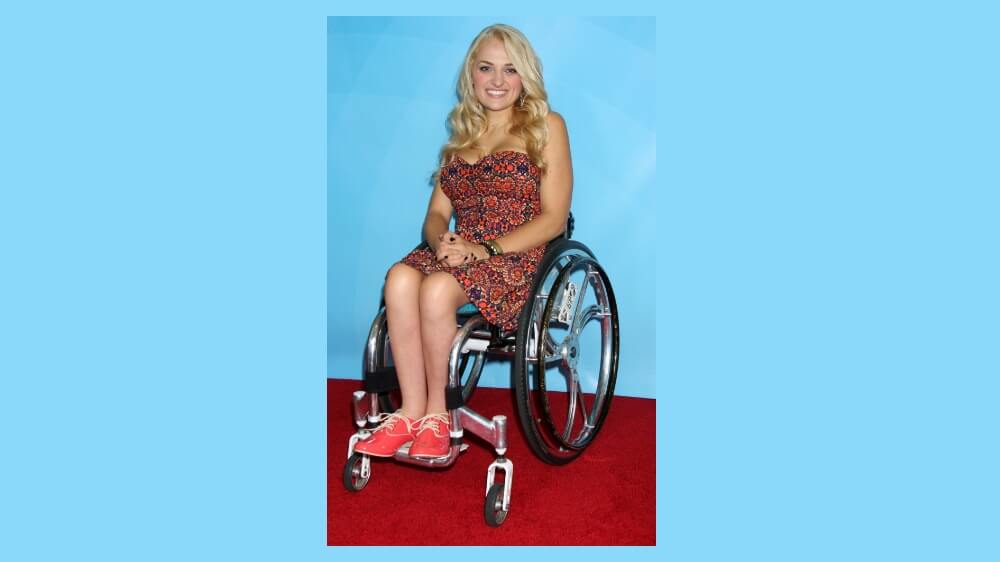Ali Stroker’s Tony Nomination Puts Disability Center Stage
Disability representation is taking center stage. Literally. And as a woman with a disability, I’m here for it.
This year’s Tony nominations were recently announced, and they signaled a historic moment: Actress Ali Stroker became the first performer in a wheelchair to score the coveted Broadway honor for her role as Ado Annie in Oklahoma!
This certainly isn’t the first time Stroker has wowed audiences with her talent. I first discovered her on The Glee Project, the 2011-2012 reality show that saw contestants competing for a role on Fox’s hit TV show, Glee. She was so forthcoming and open about her story: she was only two years old when she was injured in a car accident and has been a wheelchair user ever since, and, perhaps even more important, how she didn’t allow people to underestimate her. It was one of the first times I saw a woman speak so honestly about living life in a wheelchair, and, needless to say, it was incredibly refreshing.
At the time, I had just turned 30 and found myself navigating my world as a woman with a disability and trying to find my place in a world that wasn’t exactly built for me. But here was Stroker, on television, showing the entire world that she was bound and determined to challenge society’s expectations when it comes to disabilities. She was going to make the world fit her life, instead of the other way around.
Nearly a decade later, she’s continuing to change society and paving the way for the next phase of disability inclusion. She made her Broadway debut in Deaf West Theater’s production of Spring Awakening in 2015, earning her the distinction of being the first actor on a Broadway stage who uses a wheelchair.
Now, continuing her Broadway career as Ado Annie, Stroker is coming into her own sexual power. To see an overtly sexual character with a disability is huge, especially in a society that typically sends the message that women with disabilities are asexual beings.
“Especially growing up and as a teenager, I was always looking for role models who were in chairs. I always felt like a sexual person — I just didn’t know how to always portray that, and I never really was sure, as a kid, if being in a wheelchair could be sexy,” she recently told Vulture. “So, to arrive at this point is so exciting — more than exciting, it’s like a relief in many ways. Because finally we get to see someone who is so real.”
To pair disability with sexuality is nothing short of revolutionary. It’s not something we’ve necessarily seen so overtly on Broadway or quite so mainstream, and it’s sending the very-important message that, yes, women with disabilities can be sexy and can lean into their own sexuality just like nondisabled women. So often, disabilities are thought of as negative – sometimes even repulsive – and they’re virtually never included in mainstream conversations about sexuality. Or even in conversations about relationships in general, for that matter.
The assumption that women with disabilities are asexual beings is all at once hurtful, misguided and damaging. It’s an assumption that further puts us in the “other” category and fails to see us as whole people and all our identities instead of just part of us. And, it’s an assumption that should have been debunked decades ago.
Maybe that’s why I’m so thankful to see Stroker in the spotlight in Oklahoma! as a character who is a woman who embraces her sexuality and just happens to be in a wheelchair.
“Performing for me has been a moment where I felt like I was my most powerful self. I became hooked,” she said. “Growing up in a chair, I was used to people staring and looking at me, and that was difficult. And then when I got onstage people were staring and looking at me for the reason that I wanted. And I felt powerful.”
Powerful. That’s something people with disabilities have longed for — power over their life and power to change society’s perception of what it’s like to live with a disability. Stroker’s nomination comes at a time when, more than ever, the disability community continues to advocate for more accurate, well-rounded, positive representation in mainstream media. People with disabilities are living on their own terms, rather than conforming to any sort of expectations about how society thinks they should be.
Stroker’s monumental nomination is helping to normalize what it means to be disabled in 2019, and her role on Broadway is not just a bit character in the background. To see her so outspoken, unafraid and unapologetically confident will hopefully help other people with disabilities see themselves the same way.
I also hope that the able-bodied world really listens to what Stroker is saying and work to erase those disability stereotypes from their minds. People with disabilities aren’t living cloistered away and bedridden like in the old days. It’s a new day in the world of inclusion and we need those without disabilities to join the revolution too.
Ten years ago, a disabled actress wouldn’t even have been considered for the role of a woman exploring her sexuality — now, not only is Stroker embodying that character, but she’s also being recognized with the highest honor in the theater world! This is such a win for the disability community and a sign that inclusive representation is the way of the future.
About Rooted In Rights
Rooted in Rights exists to amplify the perspectives of the disability community. Blog posts and storyteller videos that we publish and content we re-share on social media do not necessarily reflect the opinions or values of Rooted in Rights nor indicate an endorsement of a program or service by Rooted in Rights. We respect and aim to reflect the diversity of opinions and experiences of the disability community. Rooted in Rights seeks to highlight discussions, not direct them. Learn more about Rooted In Rights



